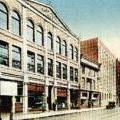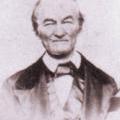 The first newspapers in the Eastern Townships served the New England settlers who populated the region at that time. They provided news (lifted from other papers, and mainly from Europe and the U.S.), political speeches, texts on religion and morality, farming techniques and technological advances, and advertisements and articles of local interest.
The first newspapers in the Eastern Townships served the New England settlers who populated the region at that time. They provided news (lifted from other papers, and mainly from Europe and the U.S.), political speeches, texts on religion and morality, farming techniques and technological advances, and advertisements and articles of local interest.
The very first paper published in the region was the British Colonist and Saint Francis Gazette, printed weekly in Stanstead from 1823 to 1834. Journalism then was not what it is today.
 Problems included distributing the paper to a widely dispersed readership; a primitive (even seasonal) road network; shortages of ink and paper; and payment by clients in kind instead of in cash. All of these things limited an editor's profits.
Problems included distributing the paper to a widely dispersed readership; a primitive (even seasonal) road network; shortages of ink and paper; and payment by clients in kind instead of in cash. All of these things limited an editor's profits.
There was an even more serious pitfall: if an editor took what was considered a radical political stance in his reporting, he ran the risk of persecution by local authorities. Such was the fate of Silas Horton Dickerson, publisher of the British Colonist. Dickerson criticized the rulings of the resident District court judge and other members of the local conservative elite, and was subsequently persecuted and finally driven out of business.
A host of daily and weekly newspapers sprung up in towns and villages all across the Eastern Townships -- Sherbrooke, Compton, Danville, Waterloo, Missisquoi, Coaticook, and many others.
Few of these papers are still in operation today. Two venerable exceptions are the Stanstead Journal, founded by Leroy Robinson in 1845, and today Quebec's oldest weekly; and The Sherbrooke Record, a daily founded in 1897 by Leonard Channell. Most of the early papers were English-language papers. In fact, it was only in the second half of the 19th century, with the large influx of French-Canadians, that more French-language papers came into being. Today, the region's most widely circulated paper is Sherbrooke's La Tribune, published in French since 1910.